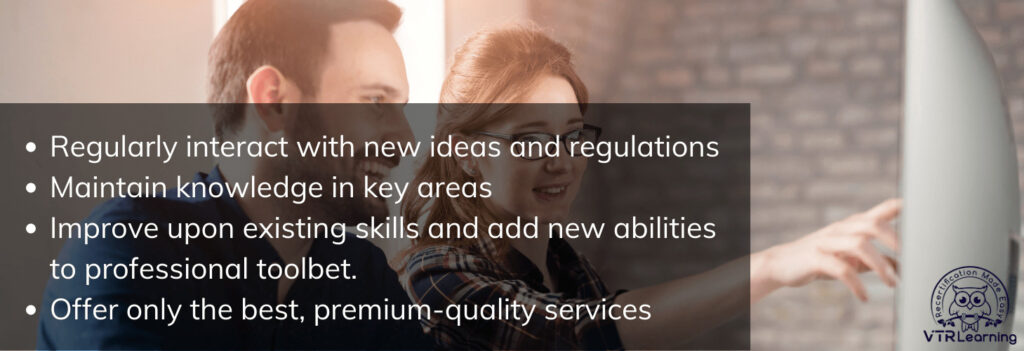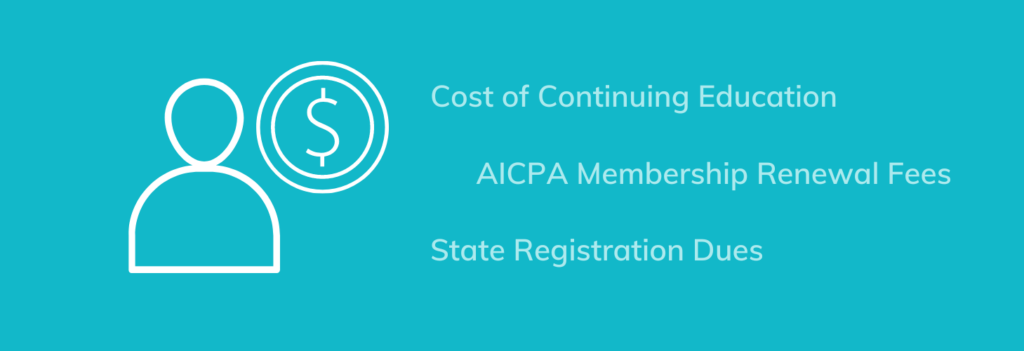
So, you just passed your CPA exam, and now you’re a licensed member of the American Institute of Certified Public Accountants. Congratulations! You shouldn’t take that accomplishment lightly. However, you should know that your journey as a professional accountant has only begun. You’ve taken the first steps into your career field, but there are still many more to go. And one that you’re going to become very familiar with is the CPA license renewal process.
As you might already know, certified public accountants don’t get to take the exam and then sit on what they’ve learned for the rest of their careers. In fact, you probably already have some work you need to be doing. But here’s the thing — that’s a confusing process. And you might be wondering where you need to go from here. Well, you’ve come to the right place, because we’ll be taking an in-depth look at the license renewal process to help you understand what your next steps should be. But before we dive in, let’s set the stage.
CPA Career Paths and Benefits
Why did you choose to become a CPA? Was it for the money, the prestige, the knowledge that you’re part of an elite group of business professionals? Whatever your reasoning, licensure with the AICPA opens up many doors and opportunities that otherwise would have remained closed. The National Registry of State Boards of Accountancy (NASBA) lists at least five important benefits for CPAs:
- Their peers highly regard them, as does the general populace, affording them a great deal of respect.
- Holding the CPA designation paves the way for career advancement in higher positions.
- CPAs have stable job security because their services are necessary in the public and professional realms alike.
- Typically, the CPA designation allows individuals to find greater satisfaction in their chosen career, because they can perform varied and important functions.
- Of course, CPA status comes with better salaried positions and job benefits.
Perhaps one or more of these reasons resonates with you. Or maybe you have an entirely different motivation for having obtained your license. After all, there are over 40 different career options open to accountants, and even more opportunities for CPAs. But no matter the motive, the important thing is that you’ve made it to this point. Now, you just have to work hard to maintain your licensed status.
CPE and the License Renewal Process
When it comes to license renewal and upkeep, the main requirement for members of the AICPA is continuing professional education (CPE). Ultimately, CPE helps certified public accountants continue growing in their knowledge of the profession throughout their life. Just as many other career fields evolve, account regulations constantly update as the industry establishes new practices. So, any individual who fails to keep up with these important developments is incapable of offering the best services to businesses and clients. For this reason, the AICPA expects its members to understand and comply with the most recent updates to the profession. Through continuing education requirements, the organization ensures that licensees:
- Regularly interact with new ideas and regulations
- Maintain their knowledge in key areas
- Improve upon their existing skills and add new abilities to their toolbelt
- Offer only the best, premium-quality services

In turn, this helps members of the organization stand above the rest of the crowd. So, speaking plainly, the reason you must complete CPE for license renewal is because it makes you the best at what you already enjoy doing. It reflects well on the AICPA as a whole and allows the general public to regard members as experts in the field.
Understanding CPA License Renewal Requirements
So far, so good — right? It’s pretty simple. You have completed the CPA exam and obtained your license. Now, in order to maintain your status, you must complete continuing professional education. That’s easy enough to understand. But hold on because here’s where things start to take a confusing turn.
The AICPA has its own set of requirements for license renewal. However, because local Boards of Accountancy oversee each state, the specific regulations typically vary from one place to another. And in some cases, it almost seems as if the state requirements conflict with the overall AICPA regulations. So, individual licensees must know the rules and stipulations governing their state in order to make sure they are complying with the correct licensing requirements. In instances where CPE regulations are not met, the member’s license could be revoked until the initial requirements, including the exam, have been met again.
Overall Requirements for CPA License Renewal
As stated by the AICPA, licensed members:
- Must complete 120 hours of approved CPE every three years, starting January 1 of the calendar following initial licensure (e.g., the recertification process for an individual who obtained their license in 2021 would begin January 1, 2022).
- May only obtain CPE hours through approved providers with NASBA. These might include self-study training courses, conferences and professional events, and university or college classes.
- Have a grace period of two months following the initial renewal period. However, any hours earned toward the deficit during this period will not count toward the next renewal cycle.
There are further stipulations for CPA license renewal, including how to calculate credit for college and university courses, reporting for programs with no stated hours, and paying financial dues. However, these details vary with the different Boards of Accountancy and are not the same for every member. The same is true for license renewal periods, forms of approved CPE, and possible reasons for exemption. For this information, CPAs must check their state-specific requirements through NASBA.
Different CPE Methods
Naturally, licensed CPAs cannot just take any CPE course and expect to obtain credit. The forms of continuing education, as well as fields of study, are limited by NASBA to specific topics pertaining to CPAs’ professional competencies. Keeping with the high standards of the AICPA, continuing education should help individuals maintain or enhance their skillsets. Not every option available contributes to this goal. Accountants likely won’t become better at their profession by attending a medical personnel conference. So, in order to regulate the type of CPE opportunities and ensure they provide quality content, NASBA provides a guide for appropriate fields of study.
As with the overall CPE requirements, the state Boards of Accountancy may further limit the approved fields of study. However, the 2019 document provides a broad yet helpful basis for determining which topics are most applicable for CPAs looking to invest in their continued learning.
Another step taken by NASBA to ensure CPE quality is limiting the available providers to those which meet strict guidelines. The Registry of CPE Sponsors is a comprehensive, searchable database that lists every approved provider of continuing professional education. With this tool, licensed members can quickly determine whether their chosen provider is approved to meet their needs. That way, there is no question as to the quality of the educational content.
Recently, the line between in-person and virtual opportunities for continuing professional education has blurred. In a post-COVID environment, many providers have learned how to make CPE traditionally delivered through events and conferences available to individuals not physically present. So, the list of in-person opportunities does overlap with those typically associated with virtual or remote settings. In that sense, these designations don’t need to be taken as hard-and-fast limitations. Instead, they are representative of the traditional forms of continuing education opportunities available.
In-Person CPE Opportunities
- Conferences – Individual members can typically obtain large amounts of CPE necessary for CPA license renewal by attending conferences and events. Generally lasting for multiple days, conferences feature individual speakers, panel discussions and workshops meant to provide CPAs with insight and new information on the profession. Another primary benefit of conference attendance is the chance to build networks and converse with peers in similar fields. However, these events are typically expensive. Especially after adding in travel costs, food and lodging, and any other necessary accommodations. So, while they are a helpful option for completing a large amount of CPE quickly, there are definite financial and time constraints to consider.
- Formal Presentations – In most states, CPAs can obtain continuing education credit by preparing and presenting on specific accounting related topics. While this is similar to conference presentation, it does not have to take place within large corporate settings. Instead, presenters can provide formal instruction to groups of any size. And so long as the information is sufficient for enhancing professional competencies, it generally counts as viable continuing education. In most jurisdictions, the instructor and learners earn some amount of CPE credit. However, discussion leaders can only present on a topic once for credit.
- Instruction – Licensed CPAs also have the option to earn credit through university course instruction. The regulations for this type of credit differ substantially between locations. But instructors are typically entitled to the same amount of credit individuals taking the course would be. So, for example, if students could claim 15 credit hours, so could the professor (also accounting for preparation time).

Online and Remote CPE Opportunities
- Self-Study Courses – One of the most popular forms of continuing education available, online courses are often self-paced and interactive. Generally speaking, they focus on specific topics of interest and include assessment sections to check comprehension. There are many online course options available through providers like the AICPA, Illumeo, Surgent and VTR Learning. And the length can range anywhere from half an hour to well over thirty, meeting the various needs of CPAs. Because these courses only require internet connection, they can be taken on the go or at home. So, they are the perfect option for busy professionals.
- Webinars – Similar to online courses, webinars are typically live or recorded events CPAs can watch to obtain CPE credit. Often, when watching live, participants must submit questions during Q&A sessions to demonstrate comprehension. Unlike self-study courses, webinars are not self-paced. So, learners must attend during a specified time period. Consequently, other virtual options represent more versatile methods of earning CPE credit. However, many sites host webinars, and a quick online search is an easy way to turn up multiple options.
- Authorship – Most state jurisdictions allow CPAs to write educational material related to accounting subjects and claim CPE credit following publication. Typically, a copy of the material must be provided for review. And since the cost in time for authorship is great, licensees must weigh priorities carefully. The amount of credit available also differs significantly from one location to another. So, members interested in this method first need to check with their Board to determine the regulations.
Of course, these lists aren’t exhaustive of the types of CPE opportunities available for meeting CPA license renewal requirements. However, they demonstrate the typical formats most Boards of Accountancy accept as legitimate.
How Much Does CPA License Renewal Cost?
The cost of CPA license renewal can vary greatly depending on preferred continuing education methods. So, it’s actually quite difficult to put a price tag, or even a range of expected costs, on the process. Ultimately, each individual must assess three factors to properly estimate how much they should expect to pay:
- Cost of Continuing Education
- AICPA Membership Renewal Fees
- State Registration Dues

As with licensing requirements, these fees will vary. Because not everyone will choose to utilize the same type of continuing education opportunities. Sometimes, employing organizations or companies will even foot the bill for their workers’ CPE. Furthermore, some state Boards of Accountancy set steep registration fees while others ask for relatively meager amounts. So, even the cost of CPA license renewal is dictated by location.
However, one cost which can be firmly determined is membership renewal with AICPA. The organization provides a table that breaks down dues by industry and role. So, individual CPAs can at least get a clear-cut idea of their financial obligations in that regard. As a baseline, the cheapest fee is currently $155, paid by retired members or those who have temporarily left the workforce. The highest priced fee is levied to organizational leaders, set at $485. Also, take note that these membership dues are paid on an annual basis. So, for every three-year licensing cycle, the payment will need to be submitted multiple times.
Speaking broadly, CPAs can expect to pay multiple hundreds, or even thousands, of dollars for the full license renewal process when all is said and done. However, individual experience shouldn’t count as the norm, since situations differ for all licensed professionals.
Free CPA CPE Options
Because license renewal has the potential to cost CPAs a large amount, it’s commonplace to seek free continuing education options. And often, providers are willing to partially meet this need. For example, VTR Learning and the Corporate Finance Institute (CFI) offer free self-study courses for CPAs. Webinars are another popular option, even though not as versatile since they happen in real-time.

Some state Boards of Accountancy set limitations on the amount of credit obtainable through specific continuing professional education methods, particularly self-study. This typically makes it impossible for individuals to earn their necessary full credit amount through free options alone. But no matter the limitations, the possibility of reducing the cost of CPE is worth looking into. One helpful resource is the Accounting Institute for Success, which provides an updated list of free CPE opportunities for CPAs.
Submitting your CPA License Renewal Forms
Once you’ve completed your continuing professional education, it’s finally time to submit your renewal documents. Though the process looks a bit different depending on your state of licensure, most jurisdictions feature online renewal portals where CPAs can turn in the necessary reporting forms and pay required fees. Most of the time, Boards will mail or email instructions to CPAs, notifying them of their upcoming recertification date. However, if this notification isn’t received for any reason, licensees can usually request the documents be sent again.
The easiest way to find license renewal instructions is by searching online for your state’s Board of Accountancy. Then, on their website, you’ll either find a list of instructions or a gated login portal where you can submit the necessary information. Some jurisdictions still allow renewal forms to be mailed or turned in physically. So, individual CPAs should check the options available for their location if they prefer this method.
Choosing Not to Renew a License
Sometimes, it may be in a person’s interest to opt out of license renewal. However, there are stipulations for doing so in good standing. Typically, members not wanting to renew their license must notify their Board in writing of their reasons for doing so. If an individual waits until their license renewal date has passed without notifying the Board of their intentions, their license could automatically be revoked. This would count as a disciplinary action on their CPA record, which could make licensure difficult if they wanted to renew it in the future. So, licensees should research the proper procedures for notifying their Board if they decide to allow their license to lapse.
It is important to recognize that some licensed individuals will automatically be exempted from the continuing professional education requirements mandated for renewal. In most cases, these individuals must not make their services available to third parties. Categories for automatic exemption include:
- Retired members of the AICPA
- Unemployed members
- Licensees who have temporarily left the workforce and have the intention of returning at a later date
- Those who have formally list their organizational status as “inactive”
It is important to recognize the differences in lapsed or revoked licensing status and automatic exemptions for individuals who are still members of the AICPA. Though people in both groups may no longer practice, there are still requirements and stipulations to be aware of.
Concluding Remarks
Licensure with the AICPA is something to be proud of. It marks individual accountants as trustworthy members of a prestigious group who adhere to a code of professional conduct. It also opens up many doors to success. But with those benefits come a host of important requirements and responsibilities.
The CPA license renewal process can be confusing, but there are plenty of resources available to help make it manageable. Moreover, we’ve even put together a list of helpful tips for maintaining your license.
Ultimately, once you have a few cycles under your belts, it all becomes a little clearer. So, get out there, find the continuing professional education that’s right for you, and knock out your license renewal.
Last Updated:



![Effective Communication While Working Remotely [4 Tips]](https://assets.vtrlearning.com/wp-uploads/2023/02/Effective-Communication-While-Working-Remotely.png)

![Montana CPA CPE Requirements [Updated 2025]](/wp-content/uploads/2020/11/Montana-CPA-CPE-Requirements.png)